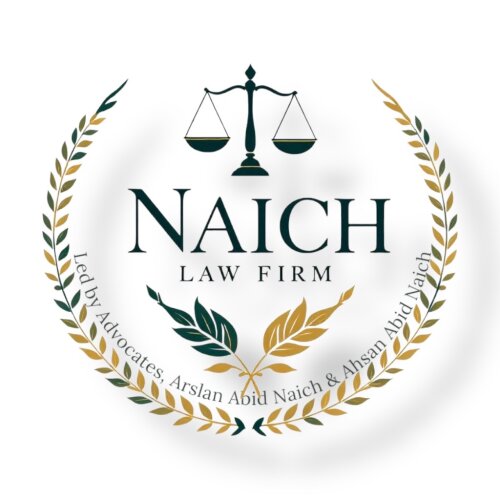Best E-commerce & Internet Law Lawyers in Karachi
Share your needs with us, get contacted by law firms.
Free. Takes 2 min.
List of the best lawyers in Karachi, Pakistan
About E-commerce & Internet Law in Karachi, Pakistan
E-commerce and Internet Law in Karachi, Pakistan, is a dynamic field that covers various legal issues related to online business operations. This includes regulatory compliance, digital transactions, consumer protection, intellectual property rights, data protection, and online privacy. As more businesses move online, understanding the legal frameworks governing e-commerce has become increasingly important. Karachi, being Pakistan's largest city and a hub for business, plays a vital role in the evolution and enforcement of these laws.
Why You May Need a Lawyer
There are several situations in which you might need legal assistance in the field of E-commerce & Internet Law:
- Launching an E-commerce Business: Ensuring your business complies with local regulations, tax obligations, and consumer protection laws.
- Intellectual Property Issues: Protecting your brand, website content, and digital assets from infringement.
- Data Protection and Privacy: Implementing secure data management practices to comply with privacy laws and protect customer information.
- Contractual Agreements: Drafting, reviewing, or negotiating business terms, agreements, and partnerships.
- Dispute Resolution: Addressing and resolving conflicts with customers, partners, or service providers.
- Fraud and Cybersecurity: Responding to e-commerce scams, hacking incidents, and other cybercrime issues.
Local Laws Overview
Understanding local laws is crucial for anyone involved in e-commerce in Karachi, Pakistan. Key legal aspects include:
- Pakistan's Electronic Transactions Ordinance, 2002: Governs electronic contracts and digital signatures, facilitating online transactions.
- Pakistan Telecommunication (Re-organization) Act, 1996: Regulates telecommunication services, including internet-based communications.
- Prevention of Electronic Crimes Act (PECA), 2016: Addresses cybercrimes, electronic fraud, unauthorized access to data, and information system sabotage.
- Consumer Protection Laws: Protect consumers from fraud and deception in e-commerce transactions.
- Intellectual Property Rights: Laws related to copyrights and trademarks essential for online branding and product representation.
Frequently Asked Questions
What legal structure should I choose for my e-commerce business?
The legal structure depends on your business model, risk assessment, and tax implications. Common structures include sole proprietorship, partnership, and private limited companies.
How can I protect my e-commerce website's content?
Register your intellectual property rights, such as copyrights and trademarks, to protect your content legally.
What are the data protection standards I must comply with?
Ensure that you comply with PECA 2016 and other relevant guidelines on data management, including secure processing, storage, and sharing of customer data.
How can I ensure compliance with consumer protection laws?
Provide transparent information about products, prices, terms and conditions, and have a fair return and refund policy.
What should I include in an online contract?
Clearly outline the terms of service, user obligations, privacy commitments, and dispute resolution mechanisms in any online agreements.
How is e-commerce tax regulated?
E-commerce taxation varies depending on the nature of transactions and involves compliance with federal and provincial tax regulations.
What are the cybersecurity obligations for my e-commerce platform?
Implement necessary security measures like SSL, firewalls, and regular security audits to protect against data breaches and cyberattacks.
What can I do if someone infringes on my trademark online?
Contact a lawyer to issue a cease-and-desist letter and explore further legal action against the infringer.
How do I handle customer disputes and returns?
Establish a clear policy and process for handling customer grievances, returns, and refunds to minimize conflicts.
What are the advertising regulations for online businesses?
Ensure all advertising content is truthful, non-deceptive, and complies with applicable advertising standards and regulations.
Additional Resources
Here are some resources that may be helpful:
- Pakistan Telecommunication Authority (PTA): Regulatory authority for telecommunication and internet services.
- Intellectual Property Organisation of Pakistan (IPO-Pakistan): Governs IP-related matters.
- Consumer Rights Commission of Pakistan (CRCP): Provides guidelines and resources for consumer rights protection.
- Federal Board of Revenue (FBR): Offers insights on tax compliance for e-commerce.
- Ministry of Information Technology: Source for updates on IT policies and laws.
Next Steps
If you believe you need legal assistance in E-commerce & Internet Law, consider the following steps:
- Research and Prepare: Gather detailed information about your specific issue, including documentation and any relevant correspondence.
- Consult a Lawyer: Contact an experienced lawyer specializing in e-commerce law to understand your legal position and options.
- Consider Legal Aid: If affordability is a concern, explore local organizations providing legal aid or pro bono assistance.
- Stay Updated: Continuously monitor legal developments in E-commerce & Internet Law as regulations can evolve rapidly.
Legal issues in e-commerce can be complex, and professional advice can safeguard your interests and ensure compliance with all regulatory requirements.
Lawzana helps you find the best lawyers and law firms in Karachi through a curated and pre-screened list of qualified legal professionals. Our platform offers rankings and detailed profiles of attorneys and law firms, allowing you to compare based on practice areas, including E-commerce & Internet Law, experience, and client feedback.
Each profile includes a description of the firm's areas of practice, client reviews, team members and partners, year of establishment, spoken languages, office locations, contact information, social media presence, and any published articles or resources. Most firms on our platform speak English and are experienced in both local and international legal matters.
Get a quote from top-rated law firms in Karachi, Pakistan — quickly, securely, and without unnecessary hassle.
Disclaimer:
The information provided on this page is for general informational purposes only and does not constitute legal advice. While we strive to ensure the accuracy and relevance of the content, legal information may change over time, and interpretations of the law can vary. You should always consult with a qualified legal professional for advice specific to your situation.
We disclaim all liability for actions taken or not taken based on the content of this page. If you believe any information is incorrect or outdated, please contact us, and we will review and update it where appropriate.















